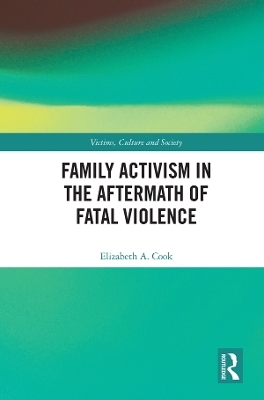
Family Activism in the Aftermath of Fatal Violence
Seiten
2020
Routledge (Verlag)
978-0-367-42278-3 (ISBN)
Routledge (Verlag)
978-0-367-42278-3 (ISBN)
Family Activism in the Aftermath of Fatal Violence explores how family and family activism work at the intersection of personal and public troubles and considers what influence family testimonies of fatal violence can have on matters of crime, justice and punishment.
Family Activism in the Aftermath of Fatal Violence explores how family and family activism work at the intersection of personal and public troubles and considers what influence family testimonies of fatal violence can have on matters of crime, justice, and punishment.
The problem of fatal violence represents one end of a long continuum of violence that marks society, the effects of which endure in families and friends connected through ties of kinship, identity and social bonds. The aftermath of fatal violence can therefore be an intensely personal encounter which confronts families with disorder and uncertainty. Nevertheless, bereaved families are often found at the forefront of efforts to expose injustice, rouse public consciousness, and drive forward social change that seeks to prevent violence from happening again. This book draws upon ethnographic research with those bereaved by gun violence who became involved in family activism in the context of fatal violence: namely, the attempts by bereaved families to manage their experiences of violent death through public expressions of grief and become proxies for wider debates on social injustice. This is an ever more pressing issue in a landscape which increasingly sees the delegation of responsibility to families and communities that are left to deal with the aftermath of violence.
An accessible and compelling read, this book will appeal to students and scholars of criminology, sociology, cultural studies, and all those interested in learning more about the after-effects of fatal violence.
Family Activism in the Aftermath of Fatal Violence explores how family and family activism work at the intersection of personal and public troubles and considers what influence family testimonies of fatal violence can have on matters of crime, justice, and punishment.
The problem of fatal violence represents one end of a long continuum of violence that marks society, the effects of which endure in families and friends connected through ties of kinship, identity and social bonds. The aftermath of fatal violence can therefore be an intensely personal encounter which confronts families with disorder and uncertainty. Nevertheless, bereaved families are often found at the forefront of efforts to expose injustice, rouse public consciousness, and drive forward social change that seeks to prevent violence from happening again. This book draws upon ethnographic research with those bereaved by gun violence who became involved in family activism in the context of fatal violence: namely, the attempts by bereaved families to manage their experiences of violent death through public expressions of grief and become proxies for wider debates on social injustice. This is an ever more pressing issue in a landscape which increasingly sees the delegation of responsibility to families and communities that are left to deal with the aftermath of violence.
An accessible and compelling read, this book will appeal to students and scholars of criminology, sociology, cultural studies, and all those interested in learning more about the after-effects of fatal violence.
Elizabeth A. Cook is a Lecturer in the Violence and Society Centre at City, University of London. Previously, she worked at the Universities of Oxford and Manchester. She researches in the areas of family, family activism and fatal violence.
Part One: Personal Troubles 1.Concept and Emergence of Family Activism 2.Trauma 3.Recovery and Repair Part Two: Public Issues 4.Rebuilding Family and Community 5.Maternal Grief and Activism 6.The Public Significance of Family Activism
| Erscheinungsdatum | 15.01.2021 |
|---|---|
| Reihe/Serie | Victims, Culture and Society |
| Verlagsort | London |
| Sprache | englisch |
| Maße | 156 x 234 mm |
| Gewicht | 453 g |
| Themenwelt | Sachbuch/Ratgeber ► Gesundheit / Leben / Psychologie |
| Geisteswissenschaften ► Psychologie ► Klinische Psychologie | |
| Medizin / Pharmazie ► Medizinische Fachgebiete ► Psychiatrie / Psychotherapie | |
| Studium ► Querschnittsbereiche ► Prävention / Gesundheitsförderung | |
| Recht / Steuern ► Strafrecht ► Kriminologie | |
| Sozialwissenschaften ► Soziologie ► Mikrosoziologie | |
| ISBN-10 | 0-367-42278-6 / 0367422786 |
| ISBN-13 | 978-0-367-42278-3 / 9780367422783 |
| Zustand | Neuware |
| Informationen gemäß Produktsicherheitsverordnung (GPSR) | |
| Haben Sie eine Frage zum Produkt? |
Mehr entdecken
aus dem Bereich
aus dem Bereich
das Manual zur psychologischen Gesundheitsförderung
Buch | Hardcover (2023)
Springer Berlin (Verlag)
39,99 €
Wissenschaftlich basierte Empfehlungen, Tipps und Ernährungspläne für …
Buch (2022)
Thieme (Verlag)
51,00 €


